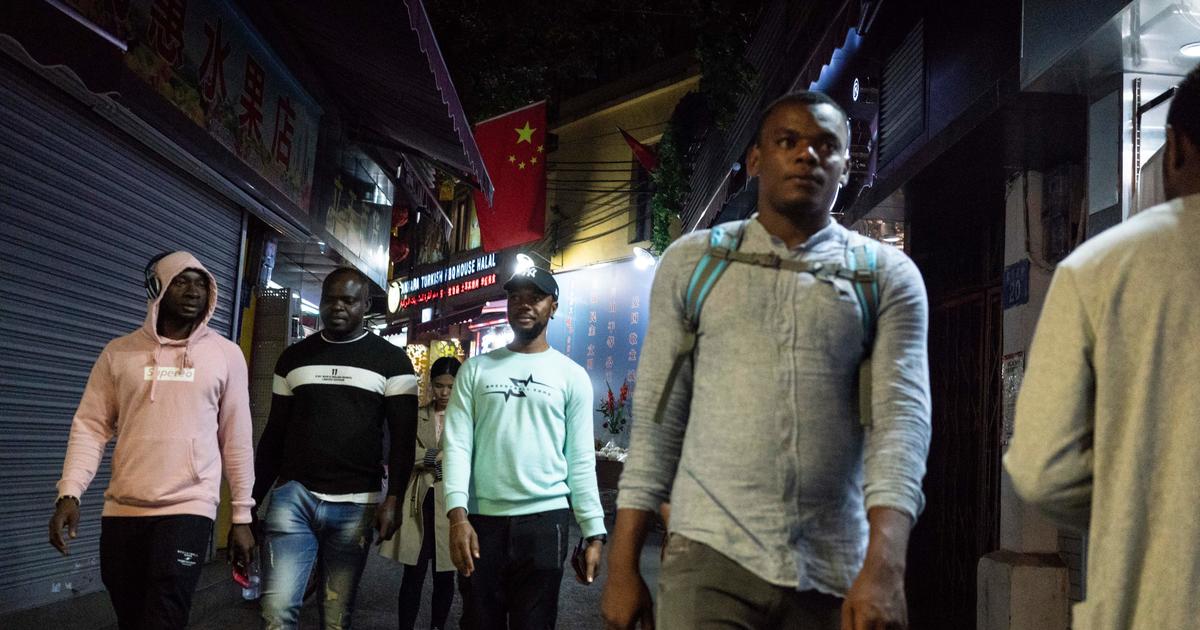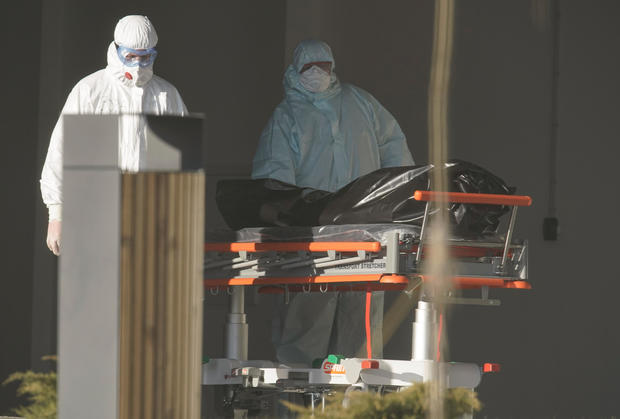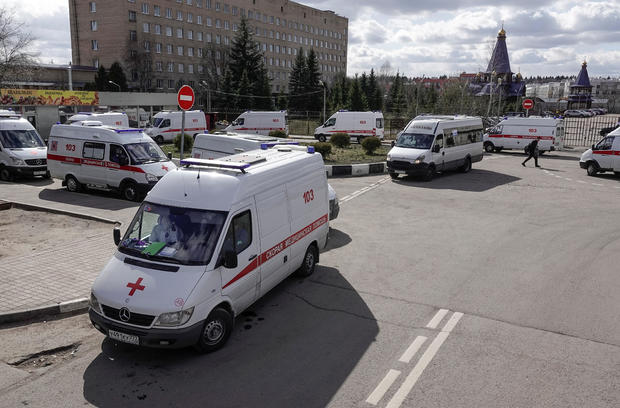Abbott Koloff, Tiffany Cusaac-Smith and Ashley Biviano
Published 2:57 PM EDT Apr 14, 2020
Some workers have been fired for speaking out about a lack of protective gear. Terrified residents are cut off from having loved ones visit in person. And state officials have declined to provide information about specific long-term care facilities while many administrators refuse to talk about the number of people infected in their facilities.
As a result, nursing home residents are getting sick and dying behind closed doors in what is largely an unseen epidemic, with the number of COVID-19-related deaths in such facilities climbing into the thousands across the northeastern U.S. while families fearing for elderly relatives scramble for information.
More than 2,400 nursing home and living facility residents have died in New York from coronavirus, which is 24 percent of the state's total fatalities. New Jersey’s 252 nursing home fatalities as of last week accounted for one in eight of the state’s death toll.
New Jersey called up combat medics from the U.S. Army National Guard last week to help at two state-run veterans’ homes, in Paramus and Menlo Park. There have been at least 24 deaths at the Paramus home attributed to the virus, and the number of residents hospitalized from the Paramus site surged to 51 on Monday, up from just eight on Saturday.
As of Wednesday, 24 others had died at the facility whose COVID-19 status was unknown, according to internal documents; still more are known to have died since then. That is higher than the typical death rate at the veterans home of about three residents per week.
Rosemarie Manion’s death in New York on April 7 was sudden and confusing to her family. The 78-year-old woman had been living at the Northern Riverview Healthcare Center in Haverstraw, in a section with other dementia patients.
Her daughter, Deborah Manion, said that she doesn't understand how she became infected because she was restricted to her floor. The facility did not comment.
“Somebody certainly brought it to her,” she said of the virus.
Left in the dark: At nursing home with multiple coronavirus deaths, families say they were left in the dark
Editorial: NJ must step up to meet nursing home crisis within a crisis
It has been difficult to get information about what is going on inside some nursing homes. State health departments refuse to disclose the number of cases and deaths for individual facilities. Some relatives say that they have been stonewalled by homes where loved ones reside.
Jennifer Jackson said she had been satisfied with the care her father had been receiving at a facility in Westchester County, New York but became concerned as the virus spread.
She said she called nurses and tried to contact administrators at the North Westchester Restorative Therapy & Nursing Center in Mohegan Lake to get information about the rate of infection there.
“They weren’t answering my call,” said Jackson, who lives in the Catskill Mountain region of New York.
She said she was given a hard time when her family tried to remove her father from the home, and that staff members blocked him from leaving because he would not sign papers. Jackson said she spoke by phone with a staff member who acknowledged that the facility had residents with coronavirus.
Story continues below photo gallery
Her father, William Jackson, 81, was allowed to leave and is now living with a nephew, she said.
The facility issued a brief statement saying it follows “all Department of Health guidelines to relay information to those we serve.”
Jill Montag, a spokeswoman for the New York Department of Health, said nursing homes should communicate to residents and their families whether anyone at a facility has tested positive for COVID-19 or is suspected of having it. However, she added that they aren’t allowed to identify those residents.
The AARP last week called upon state officials to name the facilities where outbreaks have occurred. Bill Ferris, a representative of the organization, also called on relatives of residents to complain to health officials when facilities don’t communicate with them.
He said that a directive from the New York Health Department makes it clear that facilities should be “keeping families aware of exactly what's occurring” with their loved ones and telling them “what’s going on in the facility."
New Jersey Health Commissioner Judith Persichilli has said repeatedly that nursing homes are required under state law to notify families of an outbreak of deaths at such facilities.
New York and New Jersey have been hit hard by the pandemic, but other areas also have had issues at nursing homes. Even in areas where facilities have not reported COVID-19 cases, visitors are barred, forcing relatives to communicate by video or by sitting outside of residents’ windows and talking by phone.
Delaware and Pennsylvania cases
In Delaware, 21 of 32 people who died from complications of the virus as of last week were staff members or residents of long-term care facilities. Nearly 100 people in such homes have tested positive for the virus, most of them residents.
Delaware officials said last week that four facilities had more than one positive case. Six people had died at The Little Sisters of the Poor near Newark, state officials said. The home did not respond to requests for information.
Uncertain future: Delaware nursing homes, hit hard by coronavirus, face an uncertain future
Nursing in a pandemic: Nurses during coronavirus pandemic face an uphill battle. They always have
Last week, for the first time since the pandemic began, officials in Montgomery County, Pennsylvania released information about infections in nursing homes. Of 75 homes in the county, 51 had at least one case. Two facilities each had more than two dozen cases. None of the homes were identified.
Meanwhile, the Bucks County, Pennsylvania health department has refused to provide any information about infections at long-term care facilities. That includes a 360-bed county-run home, Neshaminy Manor, in Warrington. County officials declined to say whether anyone there has tested positive.
One home in Bucks County, Ann's Choice in Warminster, advised residents on March 25 that a staff member tested positive and was quarantined at home. The facility declined to provide additional information.
Nurses face obstacles
In Hornell, New York, two nurses complained about the lack of protective gear at a nursing home, saying they did not want to wear disposable gowns that were being reused by multiple workers.
One of them, Michelle Leach, said she was fired after speaking out. She said she was worried about the potential for getting a skin infection by sharing and reusing personal protective equipment, or PPEs, that were meant to be used only once.
“Since I have been terminated for not sharing PPE a week ago, I have seen a lot of obituaries of the residents I once cared for at Hornell Gardens,” Leach said. “It’s just so sad to see this, it just breaks my heart.”
The other nurse, Colleen Cole, said that workers were told to reuse gowns and share them. She said they were often spoiled and draped on railings outside of patients’ rooms. She said she is now in quarantine after possibly being exposed to the virus.
Robert Hurlbut, the CEO of the home’s parent company, confirmed that the staff has been reusing masks but did not comment on the reuse of gowns or equipment. He declined to discuss Leach’s allegation that she was fired for speaking out.
Officials in Steuben County, New York, where the home is located, have not provided information about deaths at specific facilities. They have confirmed that there are COVID-19 cases at Hornell Gardens and two other nursing homes.
In Broome County, New York, Becky Kostyshak, a nurse, said she cared for residents who tested positive for the virus without being told about their status by her employer, the Susquehanna Nursing and Rehabilitation Center in Johnson City.
She said that the virus was brought into the center by “a visitor that shouldn’t have been there to begin with. Many people are now infected and some have died.”
The nursing home declined to comment, saying it was focusing on “exceptional patient care.”
The Broome County executive, Jason Garnar, called Susquehanna a “hotspot” for coronavirus but would not reveal the number of cases there.
The owners of The Terrace at Woodland in Rome, New York said they haven't had any cases, but are worried about a lack of tests and the shortage of protective equipment. They said residents of their assisted living facility have come back from the hospital without being tested for the virus. Even if they are tested, they said, residents return before the results come back.
"It's like throwing a match in a haystack," said Chris Vitale, an owner.
He said residents returning from the hospital are placed in isolation for two weeks as a precaution.
An official with the Hebrew Home in Riverdale, in the Bronx, New York said it has had six deaths in the past few weeks that appear to be linked to the coronavirus. The home has barred gatherings of residents and has been hobbled by 30 percent of its staff calling in sick.
“I would say we are hanging in there, but it has been very challenging,” said Daniel Reingold, CEO and president of the home’s parent company.
He said that two floors of his facility are reserved for COVID-19 patients moved from an affiliated hospital. Another eight residents who may have the disease are being kept isolated. He said staff members are “scared and nervous,” including many mothers who fear infecting their children.
While family members are not allowed in the facility, he said, daily video chats have become common.
Donna Rosenblum said she thought about taking her parents out of The Ambassador of Scarsdale in White Plains, New York when the first coronavirus cases were being reported in the region, but she felt they would receive better care at the assisted living facility.
Now, she said they are confined to their room, which has become the norm at such facilities.
“I think it’s really hard on them,” she said.
As at other homes, patients are staying in touch with relatives by video chat, with staff members rolling a 40-inch TV from room to room, said Joe Lopuzzo, the facility's chief financial officer and chief operating officer.
He said that the facility has “burned through” protective gear but received thousands of masks from Westchester County’s Office of Emergency Management. Family members have also provided protective gear, he said.
Four residents were sent to the hospital and tested positive for the virus, according to emails sent to families by the facility's president, Jean Dunphy. Stable patients are sent back to the home, according to the emails, and any residents with respiratory symptoms are isolated. The Ambassador confirmed the contents of the email but would not provide additional information about its number of cases.
In Sussex County, New Jersey, the Andover Subacute and Rehabilitation II had 14 residents and four staff members diagnosed with COVID-19, according to an April 5 memo sent to staff by the facility administrator. The cases of another 25 residents and 38 workers were under investigation at the Andover Township facility.
The administrator, Cynthia Bradford, has not confirmed those numbers or provided other information about cases at the facility.
Abbott Koloff is an investigative reporter for NorthJersey.com. To get unlimited access to his watchdog work that safeguards our communities and democracy, please subscribe or activate your digital account today.
Email: koloff@northjersey.com Twitter: @abbottkoloff
Staff writers Frank Esposito, Joe Spector, Amy Neff Roth, Karl Baker, Lisa Broadt, Jo Ciavaglia, and Jennifer Miller contributed to this report.
Let's block ads! (Why?)
https://news.google.com/__i/rss/rd/articles/CBMiiAFodHRwczovL3d3dy5ub3J0aGplcnNleS5jb20vc3RvcnkvbmV3cy9jb3JvbmF2aXJ1cy8yMDIwLzA0LzE0L2Nvcm9uYXZpcnVzLW51cnNpbmctaG9tZXMtbm9ydGhlYXN0cy1hY2hpbGxlcy1oZWVsLWRlYXRocy1zb2FyLzI5ODQ5MzMwMDEv0gEqaHR0cHM6Ly9hbXAubm9ydGhqZXJzZXkuY29tL2FtcC8yOTg0OTMzMDAx?oc=5
2020-04-14 19:10:42Z
52780727204495



